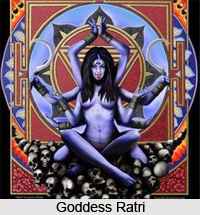 Goddess Ratri is worshipped for comfort and safety in the night. However her physical features have not been mentioned as such in any text. At times she has been mentioned as a beautiful maiden. Her sister is Goddess Usha or the dawn. She is considered as immortal and is eulogized for giving light in the darkness. She is considered as a benevolent being. She is also lauded for giving rest to all creatures. She provides vital powers.
Goddess Ratri is worshipped for comfort and safety in the night. However her physical features have not been mentioned as such in any text. At times she has been mentioned as a beautiful maiden. Her sister is Goddess Usha or the dawn. She is considered as immortal and is eulogized for giving light in the darkness. She is considered as a benevolent being. She is also lauded for giving rest to all creatures. She provides vital powers.
Ratri is considered as one of the ancient Vedic Gods who existed before the Hindu Pantheon. She is invoked by people in order to protect people from the dangers of night. She is worshipped to keep the wolves away, for protection against the thieves as well as to protect from any other harm. However some texts refer to her in negative sense. She is at times associated with things that are adverse to people. In Rig Veda she is mentioned as being chased by Lord Agni. Ratri is considered as gloomy and infertile in comparison to her sister Goddess Usha. Goddess Ratri is considered as guardian of night. She is both benign and hostile at the same time. Here references in Rig Veda have been always in connection to her sister Usha. Together they are known as mothers. They are also known as weavers of time and mothers of eternal law. They represent the stable rhythmic patterns of cosmos in which darkness and light follow each other. They represent the consistency of created order.
Goddess Ratri has the conventional attributes of the Hindu Gods which includes superhuman strength, longevity, resistance to injury and several mystical powers. She is also considered as guardian of law and order. She is the one who deposits the morning dew. She is also indicates a bleaker aspect of one who brings gloom and barrenness.
This article is a stub. You can enrich by adding more information to it. Send your Write Up to content@indianetzone.com









